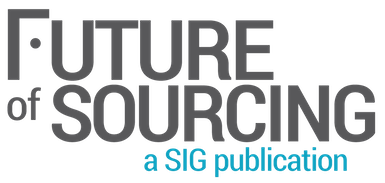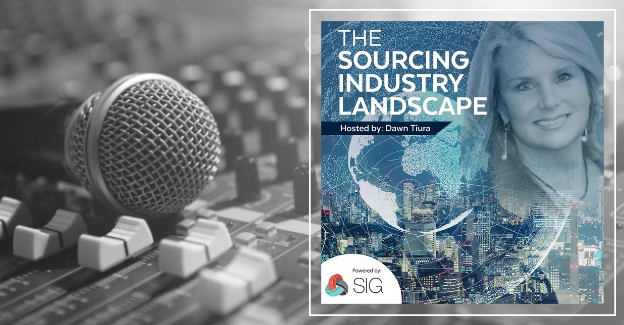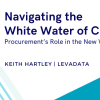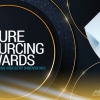Are you ready for the next wave of disruption in procurement? Join Sourcing Industry Group CEO and President, Dawn Tiura, for conversations on The Sourcing Industry Landscape with innovators who embrace technology to improve, influence and inspire procurement professionals.
Check out all episodes of The Sourcing Industry Landscape to date and subscribe to the podcast so you never miss an episode. You can listen to the podcast in iTunes, through your favorite podcast app or on our website.
In this episode of the Sourcing Industry Landscape, Dawn Tiura interviews Dennis Timpanaro. Dennis Timpanaro is the Founder and CEO of GOtivation, a fitness technology startup with a messaging platform that utilizes artificial intelligence to help personal trainers and fitness coaches motivate clients. Timpanaro is a world-ranked athlete and was the youngest global director in McDonald's history.
Dawn: Hi folks, this is Dawn Tiura from Sourcing Industry Group, also known as SIG, and I want to welcome you. Today I'm really excited. We're going to spend some time, and we're going to have a little bit of a different conversation. I'll be talking with Dennis Timpanaro. And I met Dennis when he was the Director of Strategic Sourcing at McDonald's. Yes, the hamburger company. And we got to know each other, but he also has some additional passions that he's going to share with you. And now he is in independent consulting in the sourcing space. So Dennis, thank you for joining me today.
Dennis: I am extremely happy to be here, Dawn. It's good to catch up again.
Dawn: Very good to catch up. So Dennis, just to jump around a little bit, when I met you a few years ago, you were trying out for the Olympics, is that correct?
Dennis: I was. I was. That's a true story. It has nothing to do with procurement or sourcing. I picked it up a little bit late my life, but it's still a goal that I have today.
Dawn: And what is your sport?
Dennis: I am an archer. So it's called recurve, or Olympic style archery. It's not...don't hunt. I don't do any of the traditional things. I only shoot for medals.
Dawn: That's awesome. So I'm really excited. But that's also going to...We're going to get a little bit more into your passion around health and fitness as well. But let's take a journey
backward in time. And go back to your first job when you got out of college. You've got some really interesting twists and curves in your career. You started off in retail management and market research intern at Albertsons, which is the grocer. Is that correct?
Dennis: It is. And it's funny, because if you flash forward to back when I was at McDonald's, that retail career kind of came full circle. But I spent a short time as an intern there learning one, how to manage a store and dealing with customers and their problems. But it's actually the first time I got the flavor of marketing. Because I knew nothing about marketing coming out of school. So it was a great crash course. I don't think I got good at it by any means. But it introduced me to a topic I knew nothing about.
Dawn: That's awesome. And then, so you left there though. And then I'm assuming upon graduation, you went into consulting. So tell me a little bit about consulting. Because it sounds like from what I've read, that that's about the time you got into sourcing. Am I correct?
Dennis: That was it. Yeah. I think consulting was probably the best decision I could've made coming out of school. And I didn't know it at the time. I had no idea. The offer was there. It seemed like some interesting people. It didn't settle me into one role, because I still don't know what I want to be, I guess. But consulting, it accelerated my career. It gave me some of my best friends that are still close friends to this date. And I think it solidified really my interest in sourcing and procurement. That was my first project at my first consulting group, and I haven't looked back. It's still going on.
Dawn: That's fantastic. And you spent a number of years then in consulting, and then you went to Tellabs. So tell me about Tellabs.
Dennis: The one thing I always say about consulting is, if you want to accelerate your career and learn a lot, and meet tremendously talented people, do it. But just know there's going to be a trade-off. And for me the trade up was long hours and travel—the things most folks talk about. I just got married, and one of the prerequisites was, you better be home a little more often. So, for me to do that. I ran the numbers pretty quick and thought, I guess I got to get a job in town. And there was this very interesting company called Tellabs who was just starting up an indirect procurement group. They were about a month into it when an old client and friend of mine said, hey, come join us, we're building this group. We liked working together. It was a new interesting opportunity. And we got to actually found the indirect procurement group, I think it's called Global Sourcing for this telecom company.
Dawn: That's interesting. So, you stayed there for a couple of years and then... I'm a big fan of McDonald's, I'm a Big Mac person myself. But you're a fitness fanatic. And I mean that in a nice way. And you're a professional athlete. And so tell me, what made you do the jump over to McDonalds?
Dennis: Yeah, [it was an] opportunity I really couldn't pass up. The whole fitness aside, and health aside, I had a number of friends that had left our old consulting firm and joined there. And so, they were starting up the an organization that was younger. And they said, we want to expand indirect procurement at McDonald's, which believe it or not, as good as the supply chain team, and the procurement team is at McDonald's, they didn't have any focus on indirect procurement.
Dawn: Hmm.
Dennis: Which was something like a $13 billion spend.
Dawn: Oh, my goodness.
Dennis: Yeah. An incredible number. More than any place I've been combined for probably the first 15 years. But it was an amazing opportunity. And they were looking to expand the areas they were partnering with, right? Not just your starting blocks, right? Your office supplies, and your small package. They said we want to start working with other teams, like equipment, like IT, like marketing. And again, it was an opportunity I could not pass up. I wanted to go be part of something that new, at an organization that big, and that, I think, just inspiring for me. So I joined there and it was some of the best years that I've had. I think the other nice thing about McDonald's, which a lot of people don't see from the outside; opportunities are abound when it comes to personal development.
Dennis: So, we've known each other for a number of years now. But one of the reasons why we've kept in touch so much is because they gave me the opportunity to go to SIG summits. They gave me the opportunity to take courses. They brought in speakers, and trainers, and inspirational people that helped us grow and develop. Not just as a sourcing professional but as a human being, right? We took classes on how to actually communicate better with each other. Better with my spouse. All these things. So, McDonald's really does care about improving their people. And our group was no exception.
Dawn: That's fantastic. And obviously you were successful. Because when I met you, you were the Director of Global Services. So, you certainly excelled in your career. But then you took another turn around the block and you came out starting your own startup. So let's talk a little bit about that for a moment.
Dennis: Well first of all, I don't recommend it to anyone. But no, if you look back at defining moments in your life. One that has always stuck with me was at the end of college. And I took a entrepreneurship class. I had always been interested in starting my own business. So I thought oh, well, I'll take a class, right? That's how you learn how to do this. And the professor there was a multi-time successful entrepreneur. Owned a couple of businesses, had started them himself. An adjunct professor just for fun. Because we know they don't make much. And at the end of that class, I had developed a product. It was a gardening product. Because that's another one of my weird, eclectic habits and interests. And I said all right, what do I do now? He goes, "sell it." And you would have thought you told me the earth was flat. Because I stammered and stuttered, and made every excuse in the world why I couldn't do this, and why I should just go and get a real job.
Dennis: And I was terrified to sell it and start my own business. And looking back, that stuck with me so much that I kind of chickened out at that moment. Didn't even take the next steps. And I said, "someday I'm going to avenge that decision." And that was the day. That was the day I decided to leave McDonald's. And it was time, kind of now or never, to start my own businesses. One of which, of course, is indirect independent procurement consulting.
Dennis: And then the other is a fitness technology startup. It's called GOtivation. And it is a messaging platform that's based on some artificial intelligence that helps fitness coaches and personal trainers motivate their clients, and connect with them. Because most of them are virtual these days. A lot of the times it's online coaching and training. And there's a big gap in how they're able to reach them, how much time it takes to reach them, and then certainly that level of motivation to continue to work out we all know is staggering. So, we're trying to help with a timeless problem there.
Dawn Tiura: That is so neat. So, it's go...It's spelled like motivation but go at the beginning instead of mo, correct?
Dennis: You got it. The idea—get them going.
Dawn: Yeah. So download the app for everyone that's listening. And get involved if you have a personal trainer, let them know about it. You're doing that today. So what I see through your career though is that although you say you got frozen in place at one time from one idea, but really you've had a lot of change in your career. And I think that takes a lot of bravery to step out of a comfort area and move into another area, and another area, and another area. So tell me, how do you personally get yourself unstuck?
Dennis: Yeah, I don't think I'm very brave, right? I try to be more courageous, but bravery is a generous term. But I do think every time you start something new, whether it's a new title, a new department, a new company, a new business, you're going to face that ambiguity. You're going to face uncertain, uncomfortable times. And you get stuck. You're not sure, what do I do now? And that's okay. I think a lot of people freeze and go, I don't want to do something uncomfortable, because I don't want to feel uncomfortable. I want to be good at what I do. But isn't that exactly what the best procurement people are hired for these days? To solve uncomfortable, ambiguous, challenging, weird situations—whatever they're put into. And I think the biggest advice I can give about getting unstuck, or the uncomfortableness of changes, get comfortable being uncomfortable.
Dennis: And yeah, that's a talking point. That's a talking heads type thing. But, I have actually found that you can train yourself to get more comfortable with ambiguous activities. I've never shared this story. And I guess this is an exclusive podcast release here. Only my wife knows about this, Dawn. So this is ridiculous. When I was training for the Olympics, it was like right around the time I just joined McDonald's. I took a training course to help me get mentally tougher. And one of my assignments was to write a calendar out with an activity each day that scared me or made me uncomfortable, right?
Dawn: Mm-hmm (affirmative).
Dennis: So, I had to do this for a month. And I had to come up with a lot of things that I never would've done before. It was called uncomfortable month. My wife and I coined it. I don't think that's worth any money though. So you can take that.
Dawn: Mm-hmm (affirmative).
Dennis: So, I can't share all the things I did. They've ranged from doing emotionally uncomfortable things, like I reconnected with an old coach I haven't spoken with for 20 years with a sincere thank you. I apologized to some long lost friends, no reason to talk to them anymore, but probably wasn't the nicest person.
Dawn: Wow.
Dennis: And I did some socially uncomfortable things. I led a meeting at McDonald's I knew nothing about. I remember my boss saying, all right, we've got the executive presentation called...I'm like, I want it. I'm doing it. And they're like, okay. Where did that come from? I changed my hair for a day at work, which I don't do, Dawn. I have the same haircut day in and day out. And I even made some uncomfortable store purchases. But needless to say, those types of things made me...they gave me more courage. They gave me the ability to stand on the shooting line and compete against Olympians. They gave me the ability to speak in front of a 100 person audience at SIG. Because all those little things make you more comfortable with uncomfortable, or confusing, or ambiguous situations that you get put in.
Dawn: That is [a] fantastic story. And I'm thinking, I have four children. What an amazing thing to do for them, because kids can get frozen so quickly.
Dennis: We all do.
Dawn: And you're right. The world's changing so fast that ambiguity is...you know, we're surrounded with it every day. And if we can all get more comfortable with ambiguity, and change, and the unknown, wow, that is such a cool exercise.
Dennis: I know. I'll give a plug. I don't know this person at all. But the name of the course she was teaching was called The Bullet Proof Musician. Which again, had nothing to do with archery, or sports, or business. But if you absorb ideas and content from other areas, you might stumble across something like uncomfortable month. So, give it a try.
Dawn: Wow. That is fantastic. You need to share that more, because I do think that is a wonderful training just to get comfortable and make it more of a habit to be able to let yourself be uncomfortable.
Dennis: I think it can work. It worked for a lot of people.
Dawn: Ah Dennis, you're going to have to come back and present on that at SIG one day. I love it.
Dennis: We can expand on that one, that'd be fun.
Dawn: Yeah. So I was going to ask you, and I think you just gave me one of the best pieces of advice. But if I were a procurement professional starting out today, where would you tell me to improve my talent? What should I bring to the table that is maybe not that typical, that would make me successful?
Dennis: I wouldn't have said this a year ago, because a lot of the things that you talk about at SIG, and that have been presented, I think are the building blocks you need, right? Being uncomfortable, dealing with ambiguous problems, being collaborative, not just delivering a process, but delivering a solution. I think one thing I've learned in the past year of having my own businesses, procurement folks need to learn a little marketing, procurement of marketing, right? How to source media buys or creative agencies. How do you market procurement services better? I remember for the longest time, really in every job I've been at, our tagline was, we'll save you money.
Dawn: Yeah.
Dennis: Or reduce costs. I mean, you know this is as well as I do, that is shockingly uninspiring to anybody outside of maybe the CFO. It turns people off. It has the opposite effect. Saving the money is code for, I'm going to come in, I'm going to reduce your budget, I could ask you for a whole bunch of extra work, I'm probably going to make you look stupid. Because no matter what happens here, we're not going to agree. They hate that, and they should hate that. That's our fault. We're dumb.
Dawn: Right.
Dennis: The way we talk about it. If we had studied any part of marketing, we would realize that the first step of marketing is understanding, who is your customer?
Dawn: Mm-hmm (affirmative).
Dennis: Right? What department is it? What is the organization culture like? What are their challenges? They don't care what my goal is. You don't care that I need to save a million bucks this year, or reduce some suppliers. What are their challenges? And how are you going to solve their challenges plus still accomplishing your job? What are the risks? What are the objections? What are all those things that a good marketing person would say, this is what the customer is going to be like, and this is where they need help, and this is how you're going to address their problems. Dawn, I'm stupid, right? It takes me a long time to learn some of these things until I'm put into it. But my businesses need to have a level of marketing, as rudimentary as I am at it. But those things matter. Telling your story in the right way, and relating it to your customer, whoever that is, that matters. And if you could do that, we'll let you do all the work you need to, you'll both be happy. If you can't, you got a big uphill climb. Just put it that way.
Dawn: I think that's fantastic. Because 20 years ago, and if you went into purchasing, as it was called back then…
Dennis: Yeah.
Dawn: You did what you were told. And so you didn't need a personality, and a lot of people did not have one, and just took orders, and bought things that they were told, and you're right. It's a sales job. It's a marketing job. It's a consultative job. It's so different today than it was 20 years ago.
Dennis: This helped me a lot, and I'm not sure if others have their tips and tricks, but a great starter book for marketing and sales is called The Brain Audit by Sean DeSouza. He is an illustrator turned marketer. It's a very easy to read book. There are still illustrations, because he likes that stuff. But it really helps you wrap your mind around, how do you talk about yourself? How do you address problems, and objections, and the risks? Not in a negotiation setting, but in a marketing setting. Really, really good one to get started with.
Dawn: Brain Audit. All right, I'm going to put that on my reading list. Because I'm always looking for something else to get me stimulated that way.
Dennis: Yeah. It's a best seller.
Dawn: So now you're doing independent consulting, and running a startup company, and you've got children. And I know you're still married. So how are you doing? How do you get all this—
Dennis: For now, yeah.
Dawn: So how do you get your work life balance? How are you balancing all of those at one time?
Dennis: It's unhealthy. No, I think it's really about balance. There's a couple of things I tend to read a lot about. How do you find enough time of the day to do things? How do you remain efficient? Because we all slip on those things. And it's a lot of simple stuff. It's not a lot of these hacks that you think. What's your special efficiency hack that you can cheat? It's not what it is. It's a lot of simple processes. And for me, the number one is: put things on a calendar. I know that sounds so rudimentary, and everyone's going to roll their eyes and think, that's not a tip. What's the point in that? If it's not on the calendar, it doesn't get done.
Dawn: It's not real.
Dennis: And that goes for everything. Yeah. You know what it's like. It's not just within SIG. It's not just within GOtivation, or procurement consulting. I schedule my workouts, my training sessions. I scheduled out...last night I had a bonfire with my five-year-old son. I put it on the calendar so I knew when I'd get him and I had to get marshmallows. So if you schedule things, you can balance it. It helps you manage your time better. I also think that they play off each other in strange ways. Things you wouldn't expect. So, I had some friends that are really into just one type of role. They are known for INA accountants, right? That's what I do. I enjoy basketball. That's what I do.
Dennis: Whatever it is. But, the inspiration and the ideas you get from having all those different things, having a family, having friends, having sourcing and procurement in my life, always. Having a startup. Right? Where I just talked about learning marketing, and technology, and AI, archery. All these things kind of come together. They help you in strange ways, because you pick up new ideas from each of them. And it can honestly apply them to most other things you're doing. So it's not answering that question, how do you balance them? But it's how do you stay sharp and how do you stay talented only doing one thing?
Dawn: Well that's true. And at the same point, you're trying to stay sharp and be the best in a number of things. So I mean, kudos to you. So, you didn't make the cut for the 2016 Olympics.
Dennis: Oh. Uh-uh.
Dawn: And I don't mean to rub that in, but you're still going strong.
Dennis: Yeah.
Dawn: Are we going to see you in 2020?
Dennis: We're going to find out. It's been a strange year. Maybe this goes back to your time management question. I have less time than ever right now to train and practice for archery. And the funny thing is, the less time you have, the more efficient you need to be.
Dawn: Mm-hmm (affirmative).
Dennis: So, after a winter of working a lot of hours doing consulting work, and the startup business, and trying to get some family time in. My wife has a long commute and a tough job too. We're all stressed with time. A 30 minute practice here and there is really all I'm left with, and a couple of days for strength training. Somehow those 30 minutes a couple of days a week helped me hit all new personal best in the last 45 days.
Dawn: Oh, my goodness.
Dennis: Personal best that I haven't hit...It's been three or four years since I've even been at that level somehow, when I was training for the Olympics. So, it's just a funny thing, right? When you start to forget about something, and it's not the only thing you're focused on in your life, you get a little sharper at it. You got to really focus that time. So, 2020, it's a stretch. But I also didn't think I'd be doing so good right now. So you never know. I'm not giving up.
Dawn: Oh, that's fantastic. Dennis, I want to check in with you on another podcast and see where the next turn of events has taken you. Because the one thing I just love is that you have always been positive, and forward looking, and inquisitive. And you are a fantastic representative of the sourcing industry as a whole. So, I'd love to hear more about your story as you keep going through your amazing life.
Dennis: Thank you for all the compliments. I don't know if I'm amazing yet, but I hope I'm doing interesting, exciting stuff. I'd love to come back and chat with you and your audience,
Dawn.
Dawn: So, Dennis, I want to thank you for your time today. And folks, please reach out if you want to make contact. And add him into your LinkedIn circle, or your inner circle, or your old fashioned rolodex, or however it is you want to connect with folks. But I'd love for you to put Dennis in your world. He's been a great addition being in mine. Dennis, I want to thank you for your time today and I'll be getting some more very interesting people on our podcast series. So thank you. And thank you, Dennis.
Dennis: Oh, you're welcome. Anytime.
Region:





